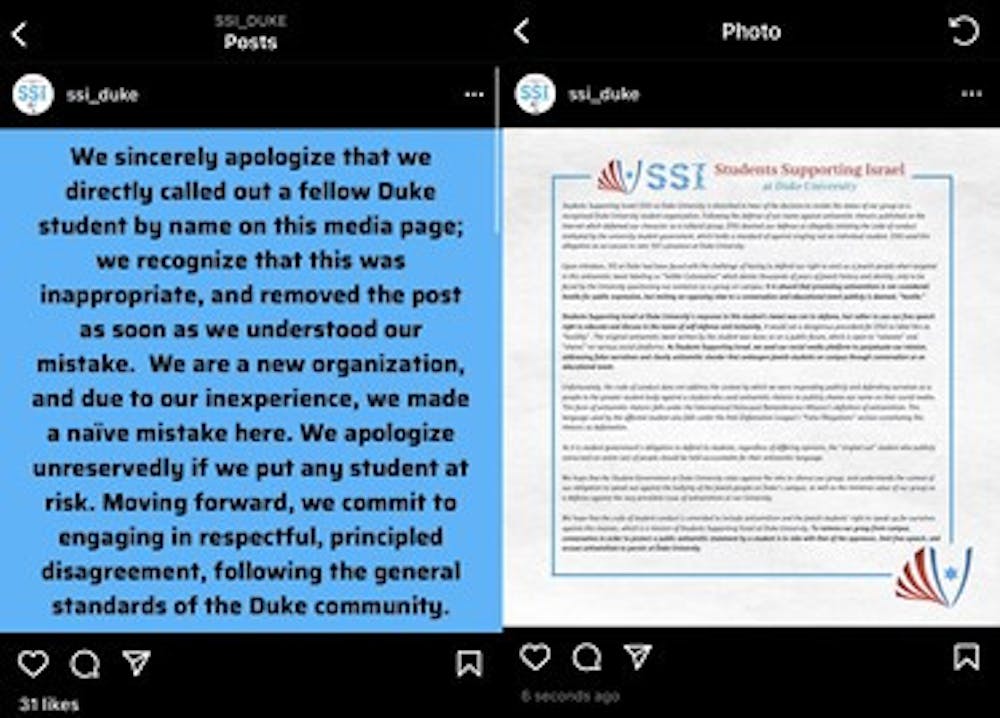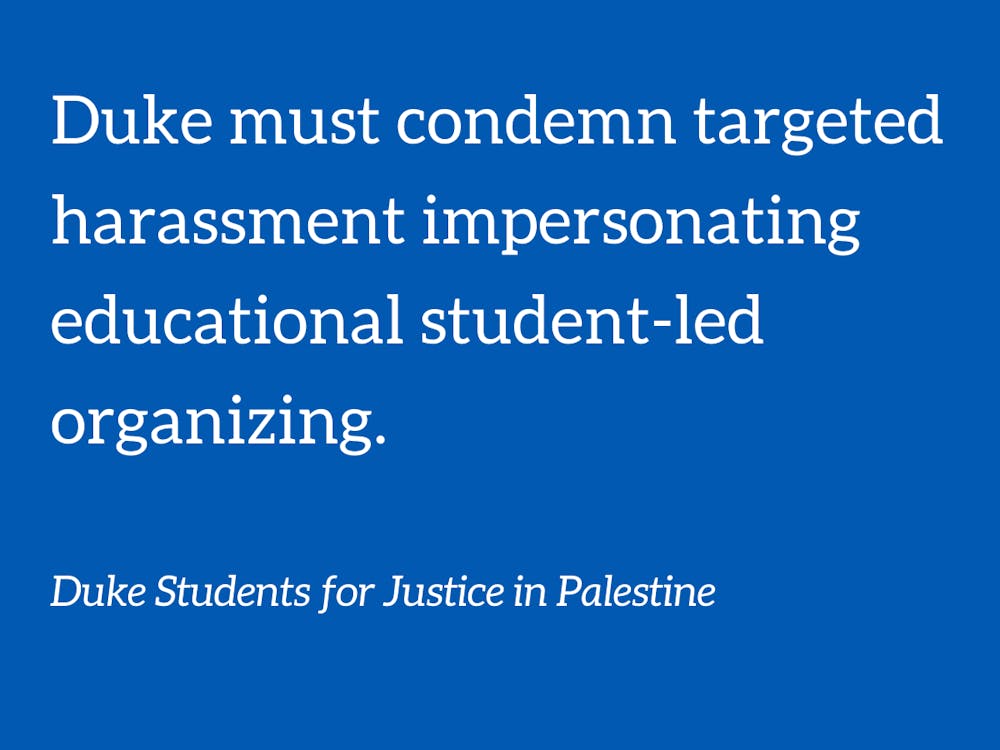Less than a week since its Duke Student Government (DSG) recognition, Duke’s burgeoning Students Supporting Israel (SSI) chapter has already performed a paradigmatic analogy of settler-colonial projects: they came, they disrupted, they crumbled.
To recap: the group posted a since-deleted screenshot of a Duke student’s tweet to their Instagram page and story. The tweet in question accused Duke University of supporting settler colonialism, in reference to DSG’s recent vote to recognize SSI. Assuming good faith, this dangerous act of doxxing may have been the neophyte organization’s bungled attempt at a social media rollout for what should have been a promising career in pro-Israel propagandizing on campus. Subsequently, the group’s recognition was vetoed by Duke’s DSG President on the grounds of harassment.
On the evening of November 15th, Duke SSI posted an apology to their Instagram, “recogniz[ing] that this was inappropriate, and remov[ing] the post as soon as [they] understood [their] mistake.” Within a day, the apology post had been deleted. As of the evening of November 16th, a new post claiming the following: “we used our social media platform to perpetuate our mission” took the place of the since-rescinded apology. The targeted harassment Duke SSI engaged in was quite simply, as they themselves have written, exactly what they intend to do on-campus.

Left: Insincere Apology Posted by Duke SSI, 11/15 —> Right: Inflammatory Statement Posted by Duke SSI, 11/16

Above: Duke SSI comment on the Inflammatory Statement from above.
In all its chaotic glory, this clumsy social media mismanagement reveals exactly the truth that SSI’s Instagram post had wanted to obfuscate: Israeli advocacy fundamentally relies upon the settler-colonial strategies of conceptual distortion and pathological displacement to reaffirm the settler-colonial principles upon which Israel was founded.
The undeniable emergence of Israeli settler-colonialism has already been extensively mapped in its ideology from the time of primitive Zionism, through its founding and up to the present day.
The father of contemporary Zionism, Theodor Herzl, aptly described the facticity of the settler colonialism he would call into being when he wrote: “If I wish to substitute a new building for an old one, I must demolish before I construct.”
When the Zionist state was founded, its first prime minister, David Ben-Gurion, inaugurated Israel as the phenomenal articulation of Herzl’s metaphorical ideations when he said that “the compulsory transfer of the [Palestinian] Arabs from the valleys of the proposed Jewish state could give us something which we never had, even when we stood on our own during the days of the first and second Temples... this is national consolidation in a free homeland.” For a more concrete idea of what Herzl and Ben-Gurion meant, toggle around on Palestine Open Maps, a project designed by Palestinian refugees to map out the systematic erasure of over 500 Palestinian villages by Zionist militias.
The foundation of Israel in its current incarnation thus rests upon the expropriation of Palestinian land and displacement of the Palestinian people of all faiths: textbook settler colonialism.
Still today, Israel does not shy away from its settler-colonial mantle as its 2018 Nation-State Law made clear when it declared that “the right to exercise national self-determination in Israel” does not extend to Palestinians. Soon after, the Knesset even banned a bill to define Israel as a state for all its citizens before it could even reach the debate floor.
Just last May, Israeli settlers backed by Israeli occupation forces were filmed taking over Palestinian homes in Jerusalem. Jacob Fauci, a settler from Long Island, explained to Palestinian Muna El Kurd "If I don't steal [your home], someone else is going to steal it." Another settler, Yonatan Yosef, went on camera to provide greater context. As other settlers forcibly empty out a Palestinian home in the background of the video, Yosef explains that the settlers “are not finish[ed] [with] the job. [They] are going to the next neighborhood, and after that [...] more.”
An unidentified settler clears up any confusion surrounding settlements, proudly exclaiming: "I see this as a continuation of the Zionist project. The return to Zion. Is it at the Arabs' expense? Yes. But our government institutions were also built at the expense of Arabs who lived here. And so was the state itself."
Oddly enough, the debates we have in the West over Israel and Zionism are not replicated overseas. Israeli settlers do not try to convince Palestinians that Israel is not a product of settler colonialism. They simply take their homes, destroy their neighborhoods and erase their presence. If we listen to the settlers and Palestinians, the supposedly complicated issue is not so complicated.
The facticity of Israeli settler colonialism is similarly undeniable in the historic and ongoing displacement of Palestinian peoples and the appropriation and occupation of Palestinian lands. However, Zionists, like those of Duke’s departed SSI, who shy away from the term “settler colonialism” argue that the Israeli project is a homecoming rather than resettlement. Such Zionist justification crumbles to pieces in the awakening of a cultural consciousness rooted in systematic and indiscriminate justice, much as Duke SSI’s has disintegrated only days after its founding.
Zionists appeal their case in the court of public perception through branding efforts aimed at engendering support for Israel as typified by so-called “birthright” trips for Jewish people in the diaspora (some sponsored by Duke itself).
These efforts to recognize the modern Zionist state as the awaited return of a bygone Israel contradict the fact, as noted by Ben Gurion, that Israel in its current incarnation as an ethnostate has no historical grounding.
Despite their best efforts, this campaign fails to muster sufficient good-feeling to obscure the pathological dimension of Israeli settler-colonialism.
More than a project of physical dislocation, settler-colonialism marks a psychological distortion for settlers who must reinterpret themselves as being the victims of an unprovoked threat in their own home: a home that does not yet exist and cannot exist so long as Palestinians are being denied an equal place in that home.
This is particularly evident in the dissonant declarations that Israel is simultaneously the sole safe-space for the Jewish people and the insecure barrier barely holding the line between a fragile citizenry and the looming threat of Palestinian retaliation and return.
Zionism transforms children with stones from Davidian underdogs into fearsome infantrymen. Zionism confuses valleys of peaceful olive branches for venues of strategic destruction. Zionism distorts the love that is the Palestinian commitment to the land into a hatred that knows no borders. Zionism equips settlers like Jacob Fauci with an aporetic longing for peace through violent conquest.
The case of Duke’s short-lived SSI echoes this phenomenon on our campus: a student who spoke a stone at the window of injustice was inadvertently endangered by a commitment to unreality. These Zionist groups may try to build a home on campus, but they will always be alien to the institution of justice whose visceral reality is the home a free people will never abandon.
To the Duke Administration, we call on you to speak up on behalf of the students you are obligated to create a safe environment for. This instance of targeted harassment is not an isolated one. It is not wholly unique or novel. Rather, it is the product of Zionist organizing’s fundamental nature. Within the last 12 hours, Duke SSI has demonstrated just that. Duke SSI’s reversal of its apology quite plainly demonstrates what the organization stands for. Duke must condemn targeted harassment impersonating educational student-led organizing if it is to create a safe environment for its students, which it claims it aims to do.
Duke should not, and must not, ignore the severity of this situation.
Signed,
Duke Students for Justice in Palestine.
Get The Chronicle straight to your inbox
Signup for our weekly newsletter. Cancel at any time.

